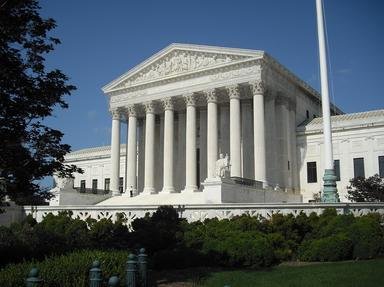Quiz Answer Key and Fun Facts
1. Samuel Alito was born to an Italian immigrant father and American mother in which U.S. state that has a high population of Italian-Americans?
2. While studying at Princeton, Alito hosted a conference called "The Boundaries of Privacy in American Society" which advocated for what specifically?
3. In the late 1970s, Alito wanted to clerk for which Supreme Court justice, who was also an NFL player, but was ultimately passed over?
4. In 1990, President George H.W. Bush appointed Alito to the Third Circuit Court of Appeals where he took part in a number of high profile cases, including Planned Parenthood v. Casey. In this case, Alito was the lone dissenter in striking down which abortion regulation?
5. President George W. Bush nominated Alito to the Supreme Court on October 31, 2005 to replace Sandra Day O'Connor after which person withdrew her nomination?
6. Alito wrote his first court opinion in Holmes v. South Carolina. In this case, Bobby Lee Holmes, on trial for rape and murder, tried presenting several pieces of evidence incriminating another person in the crime. South Carolina refused to let Holmes present this information and he was sentenced to death. Holmes sued saying he should have been allowed to present his evidence. How did Alito (and the rest of the Supreme Court) rule?
7. Alito authored the majority opinion in Ledbetter v. Goodyear Tire & Rubber Co. Did he find in favor of Ledbetter or Goodyear?
8. Alito was the lone dissenter in Snyder v. Phelps. Alito had ruled that the government could ban what and that it was NOT a restriction of the First Amendment's right to free speech?
9. Alito wrote the majority opinion in which death penalty case that ruled the use of the drug midazolam in lethal injection executions did not violate the 8th Amendment right to be free from cruel and unusual punishment?
10. In 2013, it came to light that Justice Alito was targeted by which government agency known for its spy tactics and for being whistleblown by Edward Snowden?
Source: Author
Joepetz
This quiz was reviewed by FunTrivia editor
stedman before going online.
Any errors found in FunTrivia content are routinely corrected through our feedback system.

